年代80初中英语第三册
初中英语第三册词汇

初中英语第三册词汇一、名词1.accident 意外,事故2.advertisement (=ad ) 广告3.address 地址4.adult 成年人5.advice 忠告,建议6.air (不可数)空气7.alien 外星人8.article 文章9.artist 画家,艺术家10.a kind of …一种11.a.m 上午p.m 下午12.athlete 田径运动员13.headache 头痛backache 背痛stomachache 肚痛14.balloon 汽球15.bamboo 竹16.band 乐队17.baseball 棒球18.basket 篮子19.bath 洗澡20.battle 战斗21.beach 海滩,22.bear熊23.beauty 美24.beef 牛肉pork 猪肉25.bicycle 自行车26.birth 出生27.a bit / a little bit 一点28.body 身体,躯体,尸体29.bone 骨头30.break 休息31.business 生意;事业;职责32.butterfly 蝴蝶33.button 纽扣,按钮34.mutton 羊肉35.cabbage 大白菜36.Canada 加拿大Canadian 加拿大人;加拿大的37.cancer 癌症38.candy 糖果39.capital 首都;省会40.cause 起因41.century 世纪42.chance (可数)机会43.Chinese medicine 中药44.chips 片;薯片45.chocolate 巧古力46.cloud 云47.club 俱乐部48.coffee 咖啡49.coin 硬币50.cold pill 感冒药片51.college 大学,大专院校petition 竞争,竞赛53.concert 音乐会54.congratulation 恭贺55.country(side) 乡村56.court 球场;法院57.daily日报58.dancer 舞者59.dentist 牙医60.diary 日记61.dictionary 字典,词典62.director 导演;主任63.disease (可数)疾病64.dish 碟;菜肴,菜式65.doctor 医生;博士(=Dr.)66.drawing 画作67.drum 鼓68.duck 鸭69.dustbin 垃圾箱70.duty 职责71.earth 地球;泥土72.eggplant 大象73.Egypt 埃及74.e-mail 电子邮件75.emperor 皇帝76.environment 环境77.exam (= examination)考试78.example 例子,事例,范例,模范79.exercise 练习题80.exhibition 展览81.fact 事实82.factory 工厂83.favor 帮助,恩惠84.fever 发烧85.first aid 急救86.flu 流感bird flu 禽流感87.forest 森林88.form表格89.fox 狐狸90.France 法国91.friendship 友谊92.frog 青蛙93.fruit 水果94.fur 毛皮95.germ 细菌96.goal 进球,得分;目标97.gold 黄金98.goose (复数geese )ernment 政府100.grandmother (grandma)(granny )祖母,外祖母(奶奶,外婆)101.grandfather (grandpa)祖父,外祖父(爷爷,外公)102.grass 草地103.Greece 希腊104.habit (可数)习惯105.hobby (可数)业余爱好106.happiness幸福;喜庆;喜事107.health 健康108.heart 心,心脏109.height 高度(high高的)110.weight 重量(weigh…重达…)111.hen 母鸡112.cock 公鸡113.chick 小鸡114.chicken 鸡(总称)115.hole 洞、孔116.hometown 家乡117.homeland 祖国(= motherland )118.Hong Kong 香港119.honor 荣誉120.horse 马121.host 主人122.hour 小时123.Houston Rocket 休斯敦火箭队124.human 人类125.ice (不可数)冰126.ice cream 冰淇淋127.illness 病rmation (不可数)信息,资料129.insect 昆虫130.instrument 乐器,仪器,器械131.Internet 因特网132.Ireland 爱尔兰133.jazz 爵士乐134.job (可数) 工作work (不可数)工作135.journalist 新闻记者136.joy 欢乐137.kilogram (=kg) 千克(公斤)138.kilometer (=km)千米(公里)139.knowledge (不可数)知识,学问;知晓140.river 江、河ke 湖泊142.sea 海143.ocean 洋nd 陆地nguage (可数)语言146.lift 电梯147.litter垃圾,废物148.letter 信件149.living 生计150.lots of …/ a lot of …很多(可跟可数或不可数名词)151.lung 肺heart 心脏brain 大脑stomach 胃152.machine 机器153.meal (可数)饭,餐154.meaning 意思,意义,含义155.medal 奖牌model 模特,模型,范例middle 中间的156.medicine (不可数)药157.member 成员158.message (可数)音信,口信,短信,消息e 英里lion 百万161.billion 十亿162.minute 分钟163.motto 格言164.mountain 大山,山脉165.MTV (music television)音乐电视166.musician 乐手,音乐人,音乐家167.nation 国家,民族168.nationality 国籍169.nature 自然,自然界;性质 网171.No. (= Number.) 第…号172.novel (长编)小说story (短编)小说173.object 物体;宾语174.occupation 职业175.page 页;第几页176.pain (不可数)痛苦177.painting (油、水彩)画作178.palace 宫殿179.place地方180.Paris 巴黎181.patient 病人182.planet 星球183.plant 植物184.plate 碟,盘185.player 球员,选手186.plenty of …大量的187.pond 池塘188.potato 马铃薯,土豆189.potato chips 薯条190.power 力量;能量;权力;电力191.price (不可数)价格,价钱192.king 国王193.queen 王后;皇后194.question (可数)问题195.radio 无线电,收音机196.railway 铁路197.record 记录,唱片198.report 报道,报告199.reporter新闻通讯员,记者200.republic 共和国201.enrich 丰富202.robot 机器人203.roller skating 滑旱冰skating 滑冰; skiing 滑雪204.row 排,行205.rock 岩石206.rock and roll 摇滚乐207.rubber 橡胶;橡皮208.runner 跑步者,赛跑者209.Russia 俄罗斯210.sandwich 三明治(面包)211.SARS 非典型性肺炎212.sausage腊肠,香肠213.scenery 风景,景色214.scientist 科学家215.score 得分,分数216.secret 秘密217.section 部分;部门218.sentence句子219.shame 憾事,羞愧,惭愧220.sheep (复数sheep)221.shower淋浴( take a shower 洗一个淋浴)( take a bath 洗个澡)222.situation 情况,情形;形势223.skin 皮肤224.snake 蛇225.stone 石头226.strawberry 草莓227.surface 表面228.symbol 标志,符号二、动词及短语1.act 表演;行动2.advise 劝告,忠告3.afford 负担,支付,买得起,支付得起4.agree 同意,赞成5.answer 回答6.appear 出现7.arrive( at / in …)到达8.avoid 避免9.become 成为;变得10.begin with …以…开始11.bear 忍受,容忍12.boil 煮沸boiled water (凉)开水boiling water (热)开水13.break 打破;违反14.…break out (战争,灾情,疫情等)发生15.brush 刷去16.build up oneself 增强某人体质17.call for …寻求;号召,倡议18.care 介意,在乎;关心19.care for …照顾;喜欢20.cause 促使,引起,导致21.chat 聊天22.check over …. 给…作体检23.cheer 欢呼,喝彩24.cheer … on …为…加油/喝彩25.choose 选择26.collect 收集27.continue 继续28.control 控制,操控29.cover 掩盖,覆盖30.cycle 骑(车)31.die 死亡32.dig 挖,掘33.do exercise / do sports 锻炼;做运动34.do one’s best / try one’s best 尽力do / try one’s best to do sth .尽力做某事35.download 下载36.dream 梦想37.drop 掉下来,滴下38.encourage 鼓励39.examine 检查40.fall ill / be ill 生病41.have a fever 发烧42.do someone a favor 帮助某人(= help someone)43.feed 喂,喂养44.feed on …(动物)以…为食,以…为生45.feel 感觉,觉得46.feel like doing sth 想做某事47.fight 战斗,打架48.fill 充满,填满49.fill.. with …用…充满…50.finish 完成51.form 形成,组成。
初中英语第三册下期UNIT8参考试卷

初中英语第三册下 UNIT8 参考试卷一、找出下列各组单词括号中部分读音不同的一个单词。
(1). (a)ntA.(th)inkB.mou(th)C.(th)ousandD.whe(th)er(2). (a)ntA.dan(c)eB.(c)ommonC.(c)atchD.(c)ost(3). (a)ntA.m(a)tchB.pl(a)ntC.gl(a)ssD.f(a)ther(4). (a)ntA.tr(ou)bleB.y(ou)ngC.en(ou)ghD.m(ou)ntain(5). (a)ntA.wh(i)leB.t(i)llC.sm(i)leD.kn(i)fe(6). (a)ntA.res(u)ltB.br(u)shC.min(u)teD.j(u)st(7). (a)ntA.s(e)llB.m(e)mberC.(e)veningD.dr(e)ss(8). (a)ntA.m(o)dernB.d(o)llarC.sh(o)pD.c(o)me(9). (a)ntA.b(a)llB.w(a)llC.sh(a)llD.s(a)lt(10). (a)ntA.(ch)airB.lun(ch)C.heada(ch)eD.tea(ch)er二、根据句子意思,用适当的词填空。
(1).A: What's ___ with you, Kate?B: I've got a bad headache.(2).Tom's trouble is very common these days. He'll ___ well soon.(3).Come along. I'll ___ you my new skirt, I like it very much.(4).Sam cut his finger so badly that he had to see the ___.(5).Mr Know-all knows ___ to do maths problems.三、选择填空。
初中英语第三册下期UNIT10参考试卷
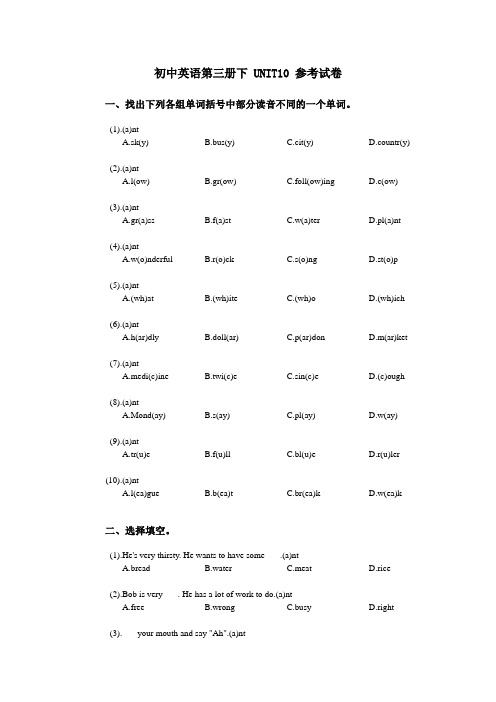
初中英语第三册下 UNIT10 参考试卷一、找出下列各组单词括号中部分读音不同的一个单词。
(1). (a)ntA.sk(y)B.bus(y)C.cit(y)D.countr(y)(2). (a)ntA.l(ow)B.gr(ow)C.foll(ow)ingD.c(ow)(3). (a)ntA.gr(a)ssB.f(a)stC.w(a)terD.pl(a)nt(4). (a)ntA.w(o)nderfulB.r(o)ckC.s(o)ngD.st(o)p(5). (a)ntA.(wh)atB.(wh)iteC.(wh)oD.(wh)ich(6). (a)ntA.h(ar)dlyB.doll(ar)C.p(ar)donD.m(ar)ket(7). (a)ntA.medi(c)ineB.twi(c)eC.sin(c)eD.(c)ough(8). (a)ntA.Mond(ay)B.s(ay)C.pl(ay)D.w(ay)(9). (a)ntA.tr(u)eB.f(u)llC.bl(u)eD.r(u)ler(10). (a)ntA.l(ea)gueB.b(ea)tC.br(ea)kD.w(ea)k二、选择填空。
(1). He's very thirsty. He wants to have some ___.(a)ntA.breadB.waterC.meatD.rice(2). Bob is very ___. He has a lot of work to do.(a)ntA.freeB.wrongC.busyD.right(3). ___ your mouth and say "Ah".(a)ntA.CloseB.LeaveC.TurnD.Open(4). John is studying in the No.14 Middle School. He is a ___.(a)ntA.studentB.farmerC.soldierD.doctor(5). This jacket is ___ of cotton.(a)ntA.madeedC.doneD.produced三、根据句子意思,用适当的词填空。
初中英语深圳版第三册课本-6【声音字幕同步PPT】

"You cut yourself badly," he said. "It's a deep cut
It's bleeding a lot. I'll clean it and put a bandage on." He washed and bandaged Ken's foot.
You can teach yourself. Words and expressions
himself 他自己
sandal
凉鞋
bare 赤裸
bare foot 赤脚
lift up 举起
nasty 讨厌的
a nasty cut
严重的
first-aid \.急救的
post 岗位;所
the first-aid post 急救站
nT-shirt T恤衫 jeans 牛仔裤
note\
纸币;笔记 arrive 到达
hold sb.by the arm 抓住某人的胳膊
arrest 拘留
yet 尚且;仍然
report
报告chieຫໍສະໝຸດ 首领get back 取回
imagine 想象
retell 复述
retold\
[retell]过去分词 woolen\ 毛织的
"He cut himself on a piece of glass,"Anne said.
"He stepped on a broken bottle,"Sue added.
年代80初中英语第一册
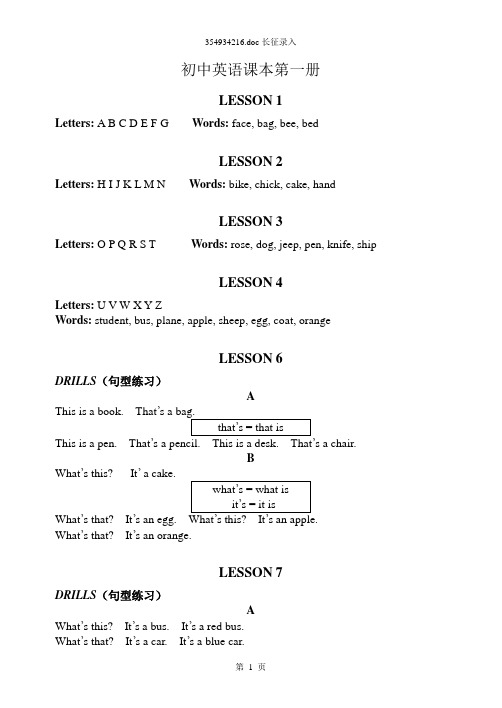
初中英语课本第一册LESSON 1Letters: A B C D E F G Words: face, bag, bee, bedLESSON 2Letters: H I J K L M N Words: bike, chick, cake, handLESSON 3Letters: O P Q R S T Words: rose, dog, jeep, pen, knife, shipLESSON 4Letters: U V W X Y ZWords: student, bus, plane, apple, sheep, egg, coat, orangeLESSON 6DRILLS(句型练习)AThis is a book. That’s a bag.that’s = that isThis is a pen. That’s a pencil. This is a desk. That’s a chair.BWhat’s this? It’ a cake.what’s = what isit’s = it isWhat’s that? It’s an egg. What’s this? It’s an apple.What’s that? It’s an orange.LESSON 7DRILLS(句型练习)AWhat’s this? It’s a bus. It’s a red bus.What’s that? It’s a car. It’s a blue car.BIs this a jeep? Yes, it is. Is it green? Yes, it is.CIs this a ship? Yes, it is. What colour is it? It’s yellow.Is that a plane? Yes, it is. What colour is it? It’s white.DIALOGUE(对话)A:What colour is this apple?B:It’s red.A:What colour is that banana?B:It’s yellow.A:What colour is an orange?B:Why, it’s orange. An orange is orangeLESSON 8DRILLS(句型练习)AThis is my cup. It isn’t your cup. My cup is white. Your cup is yellow. That isn’t his bike. It’s her bike. His bike is black. Her bike is green.isn’t = is notBIs this your desk? Yes, it is. Is that your chair? No, it isn’t. It’s his chair. Is this your rubber? Yes, it is. Is that your ruler? No, it isn’t. It’s her ruler. DIALOGUE(对话)Tom:Kate!Kate:Yes?Tom:Is this your knife?Kate:No, it isn’t.* * *Kate:Tom! Is this your pencil-box?Tom:Yes, it is. Thank you.Kate:That’s all right.LESSON 9DRILLS(句型练习)Aone ship; two ships; three cakes; four coats; five beds;six bees; seven bananas; eight oranges; nine buses; ten boxes;BThese are apples. Those aren’t apples. They’re oranges.The apples are here. The oranges are there.aren’t = are notthey’re = they areThese are desks. Those aren’t desks. They’re tables.The desks are here. The tables are there.DIALOGUE(对话)A:Look,what’s this?B:It’s a ship.A:No,it’s a sheep. These are all sheep. They’re white sheep. What are those? B:Why, they’re sheep, too. They’re black sheep.A:No, they aren’t sheep. They’re goats.GRAMMAR(语法)名词的复数形式(The Plural Number of Nouns)(Ⅰ)1、一般在单数名词末尾加-s:book-----books ruler-----rulers egg-----eggs student-----students hand-----hands rose-----roses orange-----oranges2、以s、x等结尾的词加-es:bus-----buses box-----boxes注:knife的复数形式为knives,sheep的复数形式和单数形式相同。
新课标初中英语第三册词汇(外研社初中起点)

ticket=n.票,入场券
Oscar=n.奥斯卡金像奖
Module 7=模块7
past=adj.过去的,以前的
activity=n.活动
do=v.(过去式did)做
have=v.(过去式had)有
go=v.(过去式went)去,前往
kind=n.种类
millon=n.百万
exciting=adj.使人激动的,令人兴奋的
northeast=n.东北,东北方
square=n.平方
kilometre=n.公里
statue=n.雕像,塑像
liberty=n.自由
Statue of Liberty=自由女神像(位于美国纽约)
gift=n.礼品,赠品
Italian=adj.n.意大利人的,意大利的,意大利人(语)
Italy=n.意大利
Japanese=n.adj.日本人(语),日本人的,日本的
Indian=adj.n.印度的,印度人,印度语
Module 2=模块2
national=adj.国家的,民族的
holiday=n.假日,假期
football match=n.足球比赛
noise=n.噪音,噪声
last=v.维持,持续
result=n.结果,分数
mark=v.打分数
post=n.邮件,邮政
library=n.图书馆
computer game=电脑游戏
information=n.信息,资料
site=n.站点
buy=v.(过去式bought)购买
save=v.节省
年代80初中英语第三册
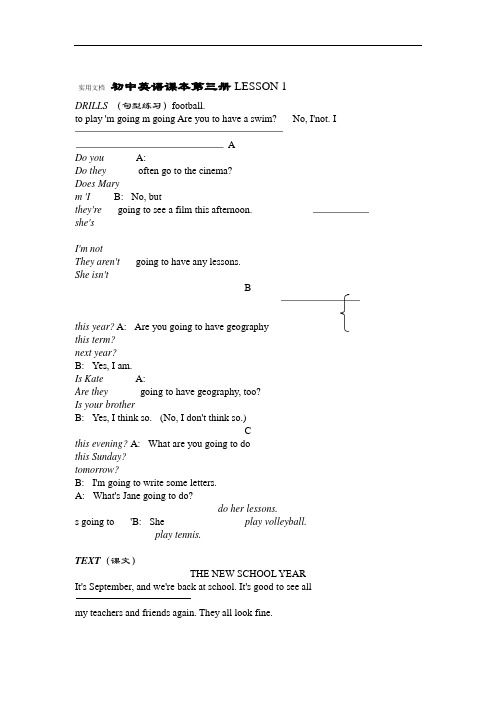
实用文档初中英语课本第三册LESSON 1DRILLS(句型练习)football.to play 'm going m going Are you to have a swim? No, I'not. IADo you A:Do they often go to the cinema?Does Marym 'I B: No, butthey're going to see a film this afternoon.she'sI'm notThey aren't going to have any lessons.She isn'tBthis year? A: Are you going to have geographythis term?next year?B: Yes, I am.Is Kate A:Are they going to have geography, too?Is your brotherB: Yes, I think so. (No, I don't think so.)Cthis evening? A: What are you going to dothis Sunday?tomorrow?B: I'm going to write some letters.A: What's Jane going to do?do her lessons.s going to 'B: She play volleyball.play tennis.TEXT(课文)THE NEW SCHOOL YEARIt's September, and we're back at school. It's good to see allmy teachers and friends again. They all look fine.实用文档new going to have a in Grade Two this year. We're We'rem going to work hard 't easy. I'subject-physics. I hear physics isns going to 'm not very good at maths, but Wei Fang says she'at it. Ihelp me. I think I can do better than last year.'I like English very much. I always work hard at it. This year I needs but he speaking. Zhang Hong likes English too, m going to do morem going to help him.help. I'classmates My to work for the wall-newspaper. This term I'm goings interesting work, 'say I draw well, and my handwriting is good. Itand I like it.m going to do my best this year. I'GRAMMAR(语法)Be going to 结构,打算(做什么)或将要“Be going to + 动词原形”表示就要(即将)等发生的事。
英语课文1

IT‘S UNFAIRJenny was a good girl, but she had one shortcoming. She was often late for school. One morning when she ca me in late, Mr Black, her teacher, got angry."I‘ll write to your father if you aren‘t here on time tomorrow," he told her. Jenny didn‘t want him to do that because her parents were very strict with her.The next day she got up very early and went to scho ol without breakfast. When the bell rang, she was waiti ng in her seat. The door opened and the teacher came in. But it wasn‘t Mr Blac k. It was Miss Green. Mr Black w as ill, so she was taking his class instead. How disapp ointed Jenny was!The next morning Jenny got up even earlier. After a quick breakfast she hurried to school. Just before she got to the school gate, she stopped. There was a walle t lying on the ground.She picked it up. "Whose is this?" She wondered.As she stood there, she heard the first bell. "What shall I do?" She asked herself. "I‘ll turn it in firs t," she decided. And so she did.When she hurried into the classroom, Mr Black was already beginning his lesson."Jenny White," he said as soon as he saw her. "Didn ‘t I tell you to be here on time?""I‘m sorry, sir," Jenny tried to explain. "I was l ate because I had to….""I will not to listen to any excuse," Mr Black stop ped her. "If you can‘t get here on time, I will have t o write to your father.""But Mr Black, that‘s…that‘s unfair!""Unfair! How dare you say that?" Mr Black said angr ily. "I‘ll report you to the headmaster!""I was trying to do a good deed," Jenny thought, "a nd now…" she couldn‘t keep back her tears.As soon as the bell rang for the break, the door op ened and in came Mr Smith, the headmaster. He was holdi ng a wallet in his hand. "Excuse me, Mr Black," he said, "but is this wallet yours?""Why, yes. It is mine." Mr Black was surprised. "I didn‘t know I lost it.""One of our girl found it and turn it in just befor e school started," Mr Smith said."Oh? Who was it?" Mr Black asked. "I must thank her.""It was Jenny White."Mr Bla ck‘s face slowly turned red. He looked at Je nny and said, "I‘m very sorry, Jenny. I take back what I said.""And I‘m sorry, Mr Black. I‘ll try not to be late again," Jenny said.这是1983年10月第一版初中英语第四册第4课和第5课《这是不公平的》。
初中英语第三册单词表(免费)

初中英语词汇表注:n 名词 v 动词 adj形容词adv 副词 prep介词 conj连词phr.短语 num数词 pron 代名词第三册CD player phr. 激光唱机several ['sevərəl] adj & pron 几个;若干shelf [ʃelf] (pl. shelves[ʃelvz]) n 架子;搁板already [ɔ:l'redi] adv 已经used to phr. 过去常常on [ɔn] prep 关于knowledge ['nɔlidʒ] n 知识;学问yard [jɑ:d] n 院子schoolyard ['sku:ljɑ:d] n 校园put (sth) down phr.把某物放下来step [step] n & v 脚步;走;踏入;踩librarian [lai'brɛəriən] n 图书管理员probably ['prɔbəbli] adv 很可能;大概pay (paid[peid] ,pay的过去式和过去分词)[pei]v 付钱;支付pay for ['pei fə(r)] phr. 付钱;支付sadly ['sædli] adv 难过地;悲哀地come up with phr. 找到;提出(答案,办法)mark [mɑ:k] n 记号;标记;痕迹bookmark ['buk,mɑ:k] n 书签think of phr. 想起encourage [in'kʌridʒ] v 鼓励get…back phr. 退还;送回去;取回pick…up phr. 拾起;捡起once [wʌns] adv 一次abroad [ə'brɔ:d] adv 到国外;在国外copy ['kɔpi] v 抄写;as [æz] prep 作为screen [skri:n] n 屏幕spoil [spɔil](spoilt[spɔilt],spoil的过去式与过去分词) v 糟蹋surf [sə:f] v 冲浪surfing ['sə:fiŋ] n 冲浪运动surfer ['sə:fə] n 冲浪者wave [weiv] n 浪;波浪beach [bi:tʃ] n 海(河、湖)滩have a try phr. 尝试;努力;射击twice [twais] adv 两次;两倍none [nʌn] pron 一个人也没有;没有任何东西water-ski ['wɔ:təski:] v 做滑水运动canoe [kə'nu:] v 乘独木舟describe [di'skraib] v 描写;叙述all over phr. 遍及especially [is'peʃəli] adv 特别;尤其attract [ə'trækt] v 吸引large numbers of phr. 许多no matter phr. 不论so-called ['səu'kɔ:ld] adj 所谓的possible ['pɔsəbl] adj 可能的both…and… phr. ...和...都give up phr. 放弃since [sins] adv & conj 此后;自..以来ever since phr. 从那时起;此后一直part-time['pɑ:t'taim]adj&n非全日工作的;业余时间although [ɔ:l'ðəu] conj 虽然;尽管fit [fit] adj & v 健康的;适合的;(使)适合prize [praiz] n 奖品;奖赏competition [,kɔmpi'tiʃən] n 比赛;竞争event [i'vent] n 大事;事件Olympic [əu'limpik] adj 奥林匹克的the Olympic Games phr. 奥林匹克运动会such [sʌtʃ] adj 这样的fail [feil] v 失败;不及格practice['præktis]﹠practise['præktis]n&v练习, 实践business ['biznis] n 商业;生意;事务so far phr. 到目前为止cross [krɔ:s] v 越过;穿过channel ['tʃænl] n 海峡;航道;频道;波段come true [,kʌm 'tru:] phr. 实现mainland ['meinlənd] n 大陆;本土slow [sləu] v 放慢;减速slow down phr. 减缓;减速journey ['dʒə:ni] n 旅程;旅行;路程among [ə'mʌŋ] prep在……当中proud [praud] adj 自豪的;骄傲的be proud of phr. 以……自豪(兴奋)speak highly of phr. 称赞not only…but also phr. 不但……而且pride [praid] n 自豪;骄傲unless [ən'les] conj 除非;如果不shot [ʃɔt] n 尝试;努力;射击truth [tru:θ] n 真理,真相,事实pour [pɔ:] v 倒;灌;倾泻waste [weist] adj & n 废弃的;无用的;垃圾;废物dirty ['də:ti] adj 脏的be afraid of phr. 害怕member ['membə] n 成员join [dʒɔin] v 加入;参加environment [in'vaiərənmənt] n 环境harm [hɑ:m] v损害;伤害rubbish ['rʌbiʃ] n 垃圾;废物collect [kə'lekt] v 收集;搜集whenever [hwen'evə] conj&adv无论什么时候;随时produce [prə'dju:s] v 产生;生产;制造wherever [hwɛər'evə] conj & adv 无论在(到)哪里;在任何地方neighbourhood ['neibəhud] n. 四邻;街坊;邻近litter ['litə] n & v 垃圾,废物;乱丢杂物onto ['ɔntu:] prep 在…上面;到…上面public ['pʌblik] adj 公共的;公众的spit(spat[spæt],spit的过去式和过去分词)[spit] v吐痰;吐唾沫cut down ['kʌt daun] phr. 砍倒protect [prə'tekt] v 保护tidy ['taidi] adj 整洁的;整齐的dustbin ['dʌstbin] n 垃圾箱recycle [ri:'saikl] v 再循环;回收再用contribution [,kɔntri'bju:ʃən] n 贡献make a contribution to phr. 贡献给;捐赠suppose [sə'pəuz] v 猜想riddle ['ridl] n 谜语do well in phr. 在……某方面干得好nearby ['niəbai] adv 附近headmaster ['hed'mɑ:stə] n (英)中小学校长mount [maunt] n …山;…峰as soon as possible phr. 尽可能早地;尽快except [ik'sept] prep 除…之外province ['prɔvins] n 省enjoyable [in'dʒɔiəbl] adj 愉快的;有趣的rush [rʌʃ] v 冲;奔跑rail [reil] n 轨道;铁路railway ['reilwei] n (英)铁路lively ['laivli] adj 热闹的;有生气的all kinds of phr. 各种各样的comfortable ['kʌmfətəbl] adj 舒适的;舒服的keep doing something phr. 一直做某事scenery ['si:nəri] n 风景;景色offer ['ɔ:fə] v & n 拿出;提供magazine [,mægə'zi:n] n 杂志practise ['præktis] v 实践;练习moving['mu:viŋ] adj. 活动的;移动的;动的人click [klik] n & v 咔哒声;发出咔哒声pity ['piti] n 遗憾的事,可惜的事score [skɔ:] n & v (比赛)得分own [əun] adj 自己的least [li:st] adj 最小的;最少的kid [kid] n (口语)小伙子scuba ['skju:bə] n 水肺(潜水者用的水下呼吸器)Internet ['intə,net] n 因特网,互联网络search [sə:tʃ] v 搜查,搜索double ['dʌbl] adj & v 双重的,双倍的icon ['aikɔn] n 图象符号,图标type [taip] v (用打字机或电脑)打字press [pres] v 按,压enter ['entə] v 进入button ['bʌtn] n 按钮,纽扣capital ['kæpitl] n 首都population [,pɔpju'leiʃən] n 人口,人数ridge [ridʒ] n 山脉tomb [tu:m] n 坟墓whether ['hweðə] conj 是否edge [edʒ] n 边,边缘rim [rim] n 边,缘cool [ku:l] adj (俚语)了不起cost [kɔst] v 价钱为,花费(金钱、时间等)one-way ['wʌn,wei] adj 单程的,单行的flight [flait] n 航班,飞行book [buk] v 预定(戏票、车票等)round-trip['raund,trip]adj(车票等)来回的,往返的instruction [in'strʌkʃən] n 说明,须知straight [streit] adv 一直地go straight along phr. 沿着…一直往前走whom [hu:m] pron 谁,哪个人(who的宾格)think about phr. 考虑chance [tʃɑ:ns] n 机会coral ['kɔrəl] n 珊瑚reef [ri:f] n 岩礁coral reef n 珊瑚礁sound [saund] v 听起来brochure [brəu'ʃjuə] n 小册子pool [pu:l] n 水池,水坑outdoor ['autdɔ:] adj 户外的,野外的badly ['bædli] adv 严重地,恶劣地allow [ə'lau] v 允许,准许deep [di:p] adj 深的explore [iks'plɔ:] v 探测,探险explorer [iks'plɔ:rə] n 探测者,探险者undersea ['ʌndə'si:] adj 海底的amaze [ə'meiz] v 使…大为惊讶,使惊be amazed at phr. 对…感到惊讶however [hau'evə] conj 然而,可是colourful ['kʌləfəl] adj 颜色艳丽的dead [ded] adj 死的society [sə'saiəti] n 社会since [sins] conj 由于,既然cover ['kʌvə] v 覆盖earth [ə:θ] n 陆地,大地,地球clean up ['kli:n ʌp] phr. 清除,收拾干净ocean ['əuʃən] n 海洋,大洋pollute [pə'lu:t] v 污染,弄脏group [gru:p] n 组,群,团队terrific [tə'rifik] adj (口语)很棒的,极好的as long as phr. 长达…sometime ['sʌmtaim] adv (未来的)某时deal [di:l] n (口语)协议,交易shark ['ʃɑ:k] n 鲨鱼on earth [ɔn 'ə:θ] phr. 在地球上alike [ə'laik] adj 相似的,相像的attack [ə'tæk] n & v 攻击,袭击Africa ['æfrikə] n 非洲South Africa n 南非watchtower ['wɔtʃ'tauə] n 监视塔,瞭望塔warn [wɔ:n] v 警告,提醒appear [ə'piə] v 出现,露面able ['eibl] adj 有能力的,能干的be able to phr. 能,会neatly ['ni:tli] adv 整洁地own [əun] v 拥有,所有spirit ['spirit] n 精神inventor [in'ventə] n 发明者,创造者try out ['trai aut] phr. 实验,尝试pupil ['pju:pl] n 小学生,学生build [bild] v 建立,建造,建设at the age of phr. 在…岁时print [print] v 印刷,印制track [træk] n (火车等的)轨道,跑道frighten ['fraitən] v 惊恐,吓唬frightened ['fraitnd] adj 受惊的,害怕的rush out ['rʌʃ aut] phr. 冲出去safety ['seifti] n 安全telegraph ['teligrɑf] n 电报invention [in'venʃən] n 发明,创造open up ['əupən ʌp] phr. 开设,开业,开放lifetime ['laiftaim] n 一生,终生graduate ['grædjueit] v 毕业turn down ['tə:n daun] phr. 关小,调低healthily['helθili] adv 健康地clearly ['kliəli] adv 清楚地frustrate [frʌs'treit] v 使沮丧,使失败frustrated [frʌs'treitid] adj 感到灰心丧气的wonder ['wʌndə] v 惊奇,惊讶,(对...)感到怀疑worth [wə:θ] adj 有…的价值,值得confidence ['kɔnfidəns] n 信心,自信merry ['meri] adj 愉快的;欢乐的decorate ['dekəreit] v 装饰,修饰put up ['put ʌp] phr. 挂起,举起angel ['eindʒəl] n 天使,守护神circle ['sə:kl] v & n 环绕,绕行圆,圈子eve [i:v] n (节日或重大事件发生的)前夕stocking ['stɔkiŋ] n 长统袜pet [pet] n 宠爱的动物as well [əz 'wel] adv 又,同样地kind-hearted adj 好心的chimney ['tʃimni] n 烟囱,烟筒single['siŋgl] adj 单个的,只有一个的base [beis] v 以…作根据,基于base on phr. 以…(为)根据real ['ri:əl] adj 真正的,真实的Turkey ['tə:ki] n 土耳其shy [ʃai] adj 害羞的,腼腆的hang[hæŋ] v吊着,悬挂fireplace ['faiəpleis] n 壁炉dry [drai] v 把…弄干,晒干though [ðəu] conj 虽然…,尽管…even though conj 即使…generosity [,dʒenə'rɔsiti] n 慷慨,豁达live on phr. 继续存在,继续活着relative ['relətiv] n 亲属,亲人greet [gri:t] v 问候,向(人)打招呼hug [hʌg] n 拥抱,紧抱western ['westən] adj 西方的,西部的traditional [trə'diʃənəl] adj 传统的,惯例的once upon a time phr. 从前,很早以前special ['speʃəl] adj 特别的,特殊的at last [ət 'lɑ:st] phr. 终于,最后owner ['əunə] n 拥有者,所有者barn [bɑ:n] n 谷仓,堆物房;马房,牛舍give birth to phr. 生(孩子)shepherd ['ʃepəd] n 牧羊人be made in phr. 在…生产或制造be made of phr. 由…组成,由…构成brush [brʌʃ] n 刷子,毛笔,画笔writing brush n 毛笔bamboo [bæm'bu:] n 竹子be used for phr. 用于pan [pæn] n 平底锅jacket ['dʒækit] n夹克衫metal ['metl] n 金属stamp [stæmp] n 邮票wool [wul] n 羊毛,绒线wood [wud] n 木头,木材lock [lɔk] n & v 锁;上锁store [stɔ:] v 储藏,存储widely ['waidli] adv 广泛地,广阔地Britain ['britən] n 英国,不列颠set [set] n 装置,设备a TV set phr. 一台电视Germany ['dʒə:məni] n 德国Frenchman ['frentʃmən] n 法国人traveller ['trævlə] n 旅行者cotton ['kɔtn] n 棉花silk [silk] n (蚕)丝camera ['kæmərə] n 照相机digital ['didʒitəl] adj 数字似的ordinary ['ɔ:dnri] adj 普通的,通常的aeroplane ['ɛərəplein] n 飞机satellite ['sætəlait] n 卫星rocket ['rɔkit] n 火箭on show [ɔn 'ʃəu] phr. 展出dinosaur ['dainəsɔ:] n 恐龙display [di'splei] n 陈列on display [ɔn dis'plei] phr. 陈列,展览natural ['nætʃərəl] adj 自然界的,天然的guide [gaid] n & v 向导,导游者;指导,引导underground ['ʌndəgraund] adj 地下的fossil ['fɔsl] n 化石desert ['dezət] n 沙漠Gobi Desert n 戈壁沙漠human being n 人disappear [,disə'piə] v 消失disappearance [,disə'piərəns] n 消失discover [dis'kʌvə] v 发现,发觉feather ['feðə] n 羽毛found [faund] v 成立,建立entrance ['entrəns] n 入口,进口,入场exit ['eksit] n 出口fragile ['frædʒil] adj 易碎的park [pɑ:k] v(将车)停放parking ['pɑ:kiŋ] n 停车(处)danger ['deindʒə] n 危险pause [pɔ:z] v & n 中止,暂停teapot ['ti:pɔt] n 茶壶bowl [bəul] n 碗serve [sə:v] v 上(酒、菜等),开(饭);服务fill [fil] v 装满,填充be filled with phr. 用…充满object ['ɔbdʒikt] n 物体dig [dig] v 挖,掘make sure [,meik 'ʃuə(r)] phr.确保,确认,查明so that conj 以便,以致hear of phr. 听说run away ['rʌn ə,wei] phr.流失,逃跑,逃走drought [draut] n 旱灾,干旱drop [drɔp] n 滴,水滴soil [sɔil] n 土壤,土地directly [di'rektli] adv 直接地leaf [li:f] n 叶子,树木、草的叶子in this way phr. 用这种方法flood [flʌd] n & v 洪水,水灾;淹没,泛滥prevent [pri'vent] v 防止,阻止northern ['nɔ:ðən] adj 北部的,北方的wide [waid] adj 宽的blow(blew[blu:],blow的过去式;blown[bləun],blow的过去分词) [bləu] v 吹sand [sænd] n 沙,沙子towards [tə'wɔ:dz] prep 向,朝farmland ['fɑ:mlænd] n 农田point [pɔint] v 指,指向…point to ['pɔint tə] phr. 指向…far away phr. 很远,遥远thanks to['θæŋks tə] phr. 由于,幸亏the more the better phr.越多越好correct [kə'rekt] adj 改正hand in phr. 交上来more or less phr. 多少有点,或多或少grand [grænd] adj 豪华的,庄重的,雄伟的hall [hɔ:l] n 大厅,会堂,会馆notice ['nəutis] n 通告,布告audience ['ɔ:diəns] n 听众slipper ['slipə] n (常用复数)拖鞋,便鞋height [hait] n 高度beeper ['bi:pə] n 袖珍无线电传呼机,电话呼叫机someday ['sʌmdei] adv (今后)有一天printer ['printə] n 打印机print [print] v 打印document ['dɔkjumənt] n 公文,文件connect [kə'nekt] v 连接,相连,联系modem ['məudem] n 调制解调器provide [prə'vaid] v 提供monitor ['mɔnitə] n 显示器point at phr. 指示,指向universe ['ju:nivə:s] n 宇宙man-made ['mænmeid] adj 人造的,人工的satellite ['sætəlait] n 卫星space [speis] n 空间,太空spaceship ['speisʃip] n 宇宙飞船send [send] v 送,寄,派(遣)send up phr. 发射,把…往上送receive [ri'si:v] v 接受,收到,得到shut [ʃʌt] v 关(门等)shut down ['ʃʌt daun] phr. 把…关上woolen ['wulin] adj 羊毛的,毛织的impossible [im'pɔsəbl] adj 不可能的mind [maind] n & v 思想,想法;关心,介意set one's mind to do phr. 一心想做…put off phr. 推迟,拖延worm ['put ɔf] n 虫,蠕虫activity [æk'tiviti] n 活动increase [in'kri:s] v 增加,增长if [if] conj 是否hour after hour phr. 一小时又一小时,连续地multiply ['mʌltiplai] v (将…)乘…multiply…by… phr. …乘以…challenge ['tʃælindʒ] n 挑战beginning [bi'giniŋ] n 开始,开端at the beginning of phr. …起初,开始square [skwɛə] n 平方,(方形的)广场hardly ['hɑ:dli] adv 几乎不more and more phr. 越来越…prefer [pri'fə:] v 宁愿(选择),更喜欢prefer to phr. 宁愿(选择),更喜欢rather than phr.宁可,是..而不是used [ju:st] adj 用过的,半旧的beg [beg] v 恳求,乞求beg one's pardon phr. 请原谅,对不起worth [wə:θ] adj 值得..的,有..的价值secondhand ['sekənd'hænd] adj 二手的,用过的diagram ['daiəgræm] n 图表discussion [di'skʌʃən] n 讨论be busy doing phr. 忙于做…chart [tʃɑ:t] n 图表download ['daunləud] v 下载path [pɑ:θ] n 路线,去路Brazil [brə'zil] n 巴西excited [ik'saitid] adj 兴奋的,激动的be excited about phr. 对…感到兴奋leather ['leðə] n 皮革wear out ['wɛər aut] phr. 把…穿旧,磨坏yen [jen] n 元,日元try on ['trai ɔn]phr. 试穿(衣服,鞋),试戴(帽子)online [,ɔn'lain] adj & adv 在线,上网ad [æd] n 广告Canon ['kænən] n 佳能(照相机牌名)shape [ʃeip] n 形状,外形decision [di'siʒən] n 决定make a decision phr. 作出决定screen [skri:n] n 屏幕form [fɔ:m] n 表格credit ['kredit] n 信用credit card n 信用卡successfully [sək'sesfəli] adv 圆满地,顺利地,成功地interest ['intərist] n 兴趣a place of interest phr. 名胜forever [fə'revə] adv 永远,总是lend(lent[lent],lend的过去式和过去分词) [lend] v把…借给,借给go over ['gəu ,əuvə(r)] phr. 过一遍,仔细检查make a mistake [,meik ə mis 'teik] phr. 犯错误suit [su:t] n 一套衣服drop off ['drɔp ɔf] phr. 放下(某物),下车opera ['ɔpərə] n 歌剧Peking opera n 京剧the Great Hall of the people n 人民大会堂huge [hju:dʒ] adj 巨大的the Palace Museum n 故宫博物院rewarding [ri'wɔ:diŋ] adj 值得作的grateful ['greitfəl] adj 感激的,感谢的wag [wæg] v 摆动,摇动(尾巴等)tail [teil] n 尾巴,尾部lonely ['ləunli] adj 孤独的,寂寞的success [sək'ses] n 成就,成功Scotland ['skɔtlənd] n 苏格兰make up one's mind phr. 下决心vet [vet] n (口语)兽医mostly ['məustli] adv 主要地,大部分heal [hi:l] v 使(伤、病)痊愈pig [pig] n 猪education [,edjukeiʃn] n 教育,培养countryside ['kʌntri'said] n 乡下,农村treat [tri:t] v 治疗,对待before long [bi ,fɔ: 'lɔŋ] phr. 不久以后regard [ri'gɑ:d] v看待,当作regard… as phr. 把…当作,当作exactly [ig'zæktli] adv 准确地,严格地keep [ki:p] v 饲养,照顾experienc e [iks'piəriəns] n 经验,体验injection [in'dʒekʃən] n 注射,打针painful ['peinfəl] adj 疼痛的,痛苦的earthquake ['ə:θkweik] n 地震rock [rɔk] v 震动,摇动as if [əz 'if] conj 好像,似乎at sea [ət 'si:] phr. 在大海上story ['stɔ:ri] n (房屋的)层two-story n 两层grab [græb] v 抓取…,夺取crash [kræʃ] v 坠落,冲撞mobile ['məubil] adj 可移动的mobile phone n 可移动电话at all [ət 'ɔ:l] phr. (用否定句)一点也不least [li:st] n 最少,最小at least phr. 至少,起码beat [bi:t] v 打败,敲打goal [gəul] n (足球)球门,得分by the time phr. 到…的时候check-out ['tʃek,aut] n(购货时的)结帐台,收银台realize ['riəlaiz] v 察觉,领悟,了解train [trein] v 训练,培养training['treiniŋ] n 训练,培养captain ['kæptin] n (足球队等)队长deserve [di'zə:v] v 应得,值得…confident ['kɔnfidənt] adj 有自信的,确信的striker ['straikə] n (足球)前锋midfield ['midfi:ld] n 中场midfield player n 中场球员excellent ['eksələnt] adj 极好的,优秀的shot [ʃɔt] n (球赛中)击,射门,投篮,发射nervous ['nə:vəs] adj 紧张不安的lazy ['leizi] adj 懒惰的carry on ['kæri ɔn] phr. 坚持下去,继续下去final ['fainl] adj 最后的amazing [ə'meiziŋ] adj 令人惊奇的be pleased with phr. 对…感到满意performance [pə'fɔ:məns] n 演出,成果,成绩teamwork ['ti:mwə:k] n 合作,协同工作baseball ['beis,bɔ:l] n 棒球never mind [,nevə 'maind] phr. 没关系boring ['bɔ:riŋ] adj 令人厌烦的spill(spilt[spilt],spill的过去式和过去分词) [spil] v 溢出,溅出,洒出from now on [frəm 'nau ɔn] phr. 从现在起,今后rule [ru:l] n 规则,规定against [ə'genst] prep 与…对抗,对着expect [iks'pekt] v 期望,预期rough [rʌf] adj 粗鲁的,激烈的necklace ['neklis] n 项链steal(stole[stəul],steal的过去式;stolen['stəulən]steal的过去分词) [sti:l] v 偷,窃取hands up phr. 举手shoot(shot[ʃɔt],shoot的过去式和过去分词)[ʃu:t] v 射击,射死detective [di'tektiv] n 侦探inspector [in'spektə] n 警官,监督员thief[θi:f] n 贼notice ['nəutis] v 注意,通知robber ['rɔbə] n 强盗,盗贼come down ['kʌm daun] phr. 下来,落escape [i'skeip] n & v 逃亡,逃走,逃避victim ['viktim] n 受害者,受骗者conversation [,kɔnvə'seiʃən] n 会话,谈话robbery ['rɔbəri] n 抢劫案,抢劫description [di'skripʃən] n 描述,描写excuse[ik'skju:s] n 借口,托词steep [sti:p] adj 陡峭的,险峻的British ['britiʃ] adj 英国人的misty ['misti] adj 有雾的,雾大的mist [mist] n 雾wonder ['wʌndə] v 惊奇,惊讶(对. . . . )感到怀club [klʌb] n 俱乐部,社团expert [ek'spə:t] n 专家,内行trap [træp] v 使…陷入困境,设陷阱捕捉tent [tent] n 帐篷freeze [fri:z] (froze [frəuz], frozen ['frəuzn]) v 结冰,凝结alive [ə'laiv] adj 活着的anytime ['enitaim] adv 在任何时候progress ['prəuɡres] v 进步,提高,前进self-respect ['selfri'spekt] n 自尊,自重essential [i'senʃəl] adj 本质的,主要的,必需的。
初中英语第三册

Unit 3
get one's ear pierced 打耳洞 concentrate on sth/sb=be concentrated with sth/sb=put one's heart into sth/sb=全神贯注于...... at present=now=at the moment reply to+sb=answer sb回答,答复某人
face to face 面对面
make faces做鬼脸 face to......面对...... keep+ n. 饲养、保存、保管、遵守 keep+adj. 使保持某种状态
keep+doing sth=go on doing sth=继续做某事 keep/stop sb from doing sth =阻止某人做某事 to begin with =at the beginning=开始 in a positive/negative way=用乐观的/消极的方法
be patient with sb/sth=对某人某事有耐心 In the end=At last=Finnaly最后
even if =even though 尽管,即使
pay attention to+ n./pron.=注意......
give up+sth/doing=放弃某物/做某事 take pride in = be pround of 对....感到自豪 be sure to do肯定会做某事 make a decision=decide to do=make up one's mind to do决定做某事 get into trouble with sb=给某人惹麻烦 afford +n./pron.负担起...... afford + to do 负担起做某事的费用 e.g.I can't afford to have it.我负担 不起拥有它的费用。 leave the school退学 leave school毕业
初中英语第三册上期UNIT14参考试卷

初中英语第三册上UNIT14 参考试卷一、根据所给问句选择合适答语。
(1). Have you got a skirt?(a)ntA. Yes, I am.B. Yes, I will.C. Yes, I have.(2). Which of these do you think is the most useful invention?(a)ntA. The second one.B. All right.C. Yes, I do.(3). Shall we go to play basketball?(a)ntA. You're welcome.B. That's a good idea.C. I can't find mywatch.(4). Will you please sing a song for us?(a)ntB. OK.C. That's good.A. Thank you verymuch.(5). Which sport are you in today?(a)ntA. Running.B. Food.C. Look.(6). Could you tell me which gate we have to go to?(a)ntA. That boy over there.B. It leaves at seven.C. Please go to Gate12.(7). What do you want to drink?(a)ntA. No, I wouldn't.B. Yes, please.C. A cup of tea, please.(8). Where have you been?(a)ntA. I've been to theB. I've gone to theC. I'll be in thehospital.hospital. hospital.(9). Have you ever ridden an elephant?(a)ntA. No, I haven't. But I've ridden a horse.B. Yes, I was.C. No, but I'd like to go.(10). Can I do anything to help?(a)nt A. I can. B. No, thanks. C. It doesn't matter.二、选择与括号内部分意思最相近的答案。
初中英语第三册第一单元
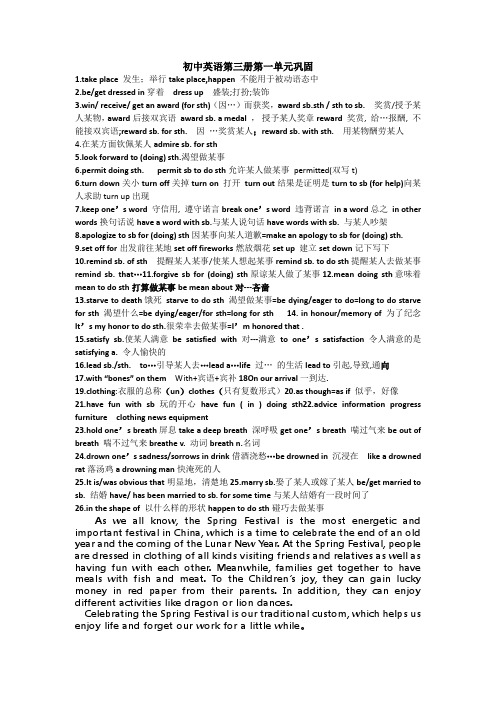
初中英语第三册第一单元巩固1.take place发生;举行take place,happen 不能用于被动语态中2.be/get dressed in穿着dress up 盛装;打扮;装饰3.win/ receive/ get an award (for sth)(因…)而获奖,award sb.sth / sth to sb. 奖赏/授予某人某物,award后接双宾语award sb. a medal,授予某人奖章reward 奖赏, 给…报酬, 不能接双宾语;reward sb. for sth. 因…奖赏某人;reward sb. with sth. 用某物酬劳某人4.在某方面钦佩某人admire sb. for sth5.look forward to (doing) sth.渴望做某事6.permit doing sth. permit sb to do sth允许某人做某事permitted(双写t)6.turn down关小turn off关掉turn on 打开turn out结果是证明是turn to sb (for help)向某人求助turn up出现7.keep one’s word 守信用, 遵守诺言break one’s word违背诺言in a word总之in other words换句话说have a word with sb.与某人说句话have words with sb. 与某人吵架8.apologize to sb for (doing) sth因某事向某人道歉=make an apology to sb for (doing) sth.9.set off for出发前往某地set off fireworks燃放烟花set up 建立set down记下写下10.remind sb. of sth 提醒某人某事/使某人想起某事remind sb. to do sth提醒某人去做某事remind sb. that…11.forgive sb for (doing) sth原谅某人做了某事12.mean doing sth意味着mean to do sth打算做某事be mean about对---吝啬13.starve to death饿死starve to do sth 渴望做某事=be dying/eager to do=long to do starve for sth 渴望什么=be dying/eager/for sth=long for sth 14. in honour/memory of 为了纪念It’s my honor to do sth.很荣幸去做某事=I’m honored that .15.satisfy sb.使某人满意be satisfied with对---满意to one’s satisfaction令人满意的是satisfying a. 令人愉快的16.lead sb./sth. to…引导某人去…lead a…life 过…的生活lead to引起,导致,通向17.with “bones” on them With+宾语+宾补18On our arrival一到达.19.clothing:衣服的总称(un)clothes(只有复数形式)20.as though=as if 似乎,好像21.have fun with sb 玩的开心have fun ( in ) doing sth22.advice information progress furniture clothing news equipment23.hold one’s breath屏息take a deep breath 深呼吸get one’s breath 喘过气来be out of breath 喘不过气来breathe v. 动词breath n.名词24.drown one’s sadness/sorrows in drink借酒浇愁…be drowned in 沉浸在like a drowned rat落汤鸡a drowning man快淹死的人25.It is/was obvious that明显地,清楚地25.marry sb.娶了某人或嫁了某人be/get married to sb. 结婚have/ has been married to sb. for some time与某人结婚有一段时间了26.in the shape of 以什么样的形状happen to do sth碰巧去做某事As we all know, the Spring Festival is the most energetic and important festival in China, which is a time to celebrate the end of an old year and the coming of the Lunar New Year. At the Spring Festival, people are dressed in clothing of all kinds visiting friends and relatives as well as having fun with each other. Meanwhile, families get together to have meals with fish and meat. To the Children’s joy, they can gain lucky money in red paper from their parents. In addition, they can enjoy different activities like dragon or lion dances.Celebrating the Spring Festival is our traditional custom, which helps us enjoy life and forget our work for a little while。
初中英语第三册讲解教案

初中英语第三册讲解教案一、教学目标1. 知识目标:(1)能够听懂、会说、会读本课的生词和重点句子。
(2)能够用英语简单描述人们的外貌和特征。
(3)能够用英语询问和回答有关人物的信息。
2. 能力目标:(1)能够正确使用一般现在时描述人的外貌和特征。
(2)能够运用所学的词汇和句型进行简单的交流。
3. 情感目标:(1)培养学生的观察力和想象力。
(2)培养学生积极参与课堂活动,大胆开口说英语的习惯。
二、教学重点与难点1. 重点:(1)本课的生词和重点句子。
(2)一般现在时的运用。
2. 难点:(1)一般现在时的用法。
(2)描述人物外貌和特征的词汇和句型。
三、教学步骤1. 热身(5分钟)(1)跟唱歌曲 "Hello, Hello, Hello!"(2)老师出示各种人物图片,让学生用中文描述人物的外貌和特征。
2. 引入(10分钟)(1)老师出示一张人物图片,让学生观察并描述人物的外貌和特征。
(2)引导学生用英语进行描述,并板书关键词汇。
3. 新课呈现(15分钟)(1)老师出示教材图片,引导学生观察并描述人物的外貌和特征。
(2)老师讲解一般现在时的用法,并让学生跟读教材句子。
(3)学生两人一组,用英语描述教材中的人物,并练习问答。
4. 练习与巩固(15分钟)(1)学生两人一组,用英语描述自己熟悉的人,并练习问答。
(2)老师出示各种人物图片,学生用英语描述人物的外貌和特征。
(3)学生进行角色扮演,用英语描述人物的外貌和特征。
5. 总结与拓展(5分钟)(1)老师引导学生总结本节课所学的词汇和句型。
(2)学生用英语编写一个小故事,描述一个人物的外貌和特征。
四、作业布置1. 抄写本课的生词和重点句子。
2. 用英语写一篇小短文,描述一个人的外貌和特征。
五、教学反思本节课通过观察、描述人物的外貌和特征,让学生运用一般现在时进行描述。
在教学过程中,要注意引导学生正确使用一般现在时,加强对学生语言表达的指导。
年代80初中英语第三册

年代80初中英语第三册There were no classesthis afternoon. My classmatesall went to the Summer Palace. They had a good time, but I didn?t go.After lunch Aunt Huang came in. she looker worried. “Grandma is ill, ” she said.“Imust take her to the hospital. Bu t my baby,? I can?t leave her by herself.”Mother and Dad were not at home. So I said, “Don?t worry. I can look 12 页354925555.doc 长征录入after her,”“Thank you, Xiao Ping. Thank you.”Then she left.The baby was about ten months old. At first she was asleep. Half an hour later she woke up. She couldn?t find her mother and began to cry.“Don?t cry,”said. I talked to her. But she looked at me and cried harder and harder.I turned on the radio. She stopped crying and listened to the music. Aftera few minutes she started to cry again.“Listen to me,”I said. I started to sing. The baby watched and listened. She didn?t cry any more. Then I made faces andjumped like a monkey. The baby laughed and laughed.All that afternoon I jumped and sang and did all kinds of things. When Aunt Huang came back, I was tired.In the evening Wang Lin came to see me. I told him the whole story. He laughed. “You?re great! I?m going to tell everyone. I?m going to tell them ,Bring your babies to Li Ping. He can take good care of your babies?”. LESSON 9DRILLS (句型练习)John writes more carefully than Tom and Peter.Right. He writes the most carefully of the three.AA:Which picture ismore beautiful?more interesting?more expensive?B:The oneon the left,I think.on the right,on the left,BA:Which lesson isthe most difficultin Book Two?the most interestingthe most instructiveLesson 15 is. Don’tyou think so? Lesson 13Lesson 6CA:Tomdraws betterthan Peter.jumps higherwrites more carefully13 页354925555.doc 长征录入B:You’re quite right. Hedraws the bestin our class. jumps the highestwrites the most carefullyDA:Is Joan astallas Kate?strongcarefulB:No, she isn’t. She isn’tquite astallas Kate.strongcareful(Yes, she’s just as tall as Kate.)DIALOGUE (对话)THEMOONSon:Look, Dad! How bright and near the moon looks tonight!Father:But it isn?t as near as it looka.Son:I know it?s far away from the earth.Father:It ?s three hundred and eighty thousand kilometers away.Son:How far is that?Father:Well, it takes more than three days to get there by spaceship. Son:A spaceship flies very, very fast, doesn?t it?Father:Yes. It flies at about eleven kilometers a second. In 1969 twoAmericans got to the moon by spaceship. That was one of the most exciting moments of that year.Son:They didn?t find any living things there, did they?Father: No, they didn?t. It?s too hot in the day and too cold at night. And there?s no air or water there. Nothing can live on the moon.Son:I hear walking on the moon is more difficult. It ?s like jumping andflying. Is that so?Father:Yes, isn?t that interesting! Everything is much lighter on the moon.You can jump much higher on the moon than on the earth.Son:I wish I could fly to the moon in a spaceship one day. It must be greatfun.NOTESIt ’s three hundred and eight thousand kilometers away.它(月球)三十八万公里。
初中英语单词 新人教版初中(第三册上)

object
n.物体
dig
v.挖;掘
make sure
确保;确认;查明
so that
以便;以致
hear of
听说
run away
流失;逃跑;逃走
drought
n.旱灾;干旱
drop
n.滴;水滴
soil
n.土壤;土地
directly
ad.直接地
leaf
n.(pl.leaves)叶子;树木(草)的叶子
n.真理;真相;事实
pour
v.倒;灌;倾泻
waste
a.废弃的;无用的n.废(弃)物;垃圾
dirty
a.脏的
be afraid of
害怕
member
n.成员
join
v.加入;参加
environment
n.环境
harm
n.损害;伤害
rubbish
n.垃圾,废物
collect
v.收集;搜集
whenever
recycle
v.再循环;回收再用
contribution
n.贡献
make a contribution to
贡献给;捐赠
suppose
v.猜想
riddle
n.谜语
do well in
在…方面干得好
nearby
ad.附近
headmaster
n.(英)中小学校长
as soon as possible
尽可能早地;尽快
surfer
n.冲浪者
wave
n.浪;波浪
beach
n.海(河、湖)滩
have a try
初中英语深圳版第三册课本-2【声音字幕同步PPT】

天气预报
no school 不上课
stay at home 回家
just 仅仅
argue['a:gju:] 争论
won't
=will not smile[smail]
微笑
even 甚至..也
stormy 有暴风雨;多风暴的
nonsense 胡说;胡闹
wise
Everyone will visit you
Thank you,Tim. Words and expressions
hate[heit] 恨;憎恨
hate doing sth
讨厌做某事
often 经常
trouble 烦恼
in trouble 处于困境之中
forecast 预测,预报 the weather forecast
His back will hurt. He will have no hair.
What else? F Let's sing What shall we do with the hungry sailor?Make his breakfast now
What shall we do with the seasick sailor?Put him on land now.
lonely 寂寞的
send sent 送;派;发
send sb.home
送某人回家 Unit 4. Tomorrow will be wet and cold
A Let's read Ken is a middle school student now.
He hates going to school.
Denis does not want to grow old. He wants to be young.
80年代中学英语教材回忆
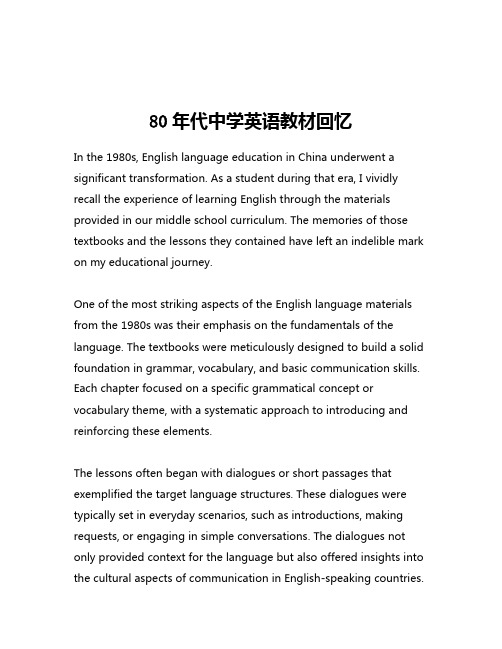
80年代中学英语教材回忆In the 1980s, English language education in China underwent a significant transformation. As a student during that era, I vividly recall the experience of learning English through the materials provided in our middle school curriculum. The memories of those textbooks and the lessons they contained have left an indelible mark on my educational journey.One of the most striking aspects of the English language materials from the 1980s was their emphasis on the fundamentals of the language. The textbooks were meticulously designed to build a solid foundation in grammar, vocabulary, and basic communication skills. Each chapter focused on a specific grammatical concept or vocabulary theme, with a systematic approach to introducing and reinforcing these elements.The lessons often began with dialogues or short passages that exemplified the target language structures. These dialogues were typically set in everyday scenarios, such as introductions, making requests, or engaging in simple conversations. The dialogues not only provided context for the language but also offered insights into the cultural aspects of communication in English-speaking countries.Following the dialogues, the textbooks would delve into detailed explanations of the grammatical rules and patterns. The explanations were often accompanied by numerous practice exercises, ranging from fill-in-the-blank activities to sentence transformation exercises. This emphasis on grammar and structural mastery was a hallmark of the English language education during that time, as it was believed to be the foundation for effective language acquisition.In addition to the grammatical focus, the textbooks also included a significant portion dedicated to vocabulary development. Each chapter would introduce a set of new words and phrases, often organized around a specific theme or topic. The vocabulary sections would include definitions, sample sentences, and opportunities for students to practice using the new words in context.One aspect of the 1980s English language materials that I particularly appreciated was the inclusion of reading comprehension passages. These passages, which ranged from short stories to informative articles, not only exposed us to authentic English texts but also challenged us to develop our reading and analytical skills. The passages often covered a variety of topics, from history and culture to science and technology, broadening our understanding of the English-speaking world.The reading comprehension exercises that followed the passages were designed to test our understanding of the content, as well as our ability to infer meaning and draw conclusions. These exercises often involved answering comprehension questions, identifying the main ideas, and even engaging in discussions or written responses to the passages.One distinctive feature of the English language materials from the 1980s was the emphasis on translation exercises. These exercises required us to translate passages or sentences from Chinese to English and vice versa. While the focus on translation may seem outdated in today's language learning approaches, it was a crucial component of the educational system at the time, as it was believed to enhance our understanding of the differences between the two languages and improve our overall language proficiency.The 1980s English language materials also incorporated a significant amount of listening and speaking practice. Audio recordings, often featuring native English speakers, were used to expose us to authentic pronunciation and intonation patterns. The accompanying exercises would involve listening comprehension tasks, such as answering questions or filling in the blanks based on the audio recordings.In terms of speaking practice, the textbooks often included role-playing activities and dialogues that we were required to perform in class. These activities not only helped us improve our conversational skills but also fostered a sense of confidence in using the language in real-life situations.Looking back on my experiences with the English language materials from the 1980s, I can appreciate the comprehensive and systematic approach they took to language education. While the focus on grammar and translation may seem outdated in today's communicative language teaching methods, the foundation it provided was invaluable in shaping my understanding and proficiency in the English language.The meticulous attention to detail, the emphasis on practice and reinforcement, and the exposure to a wide range of topics and cultural contexts all contributed to the development of my language skills. The memories of those textbooks and the lessons they contained have remained with me, serving as a testament to the dedication and foresight of the educators who designed them.As language learning continues to evolve, it is important to acknowledge the contributions of the past and recognize the valuable lessons that can be drawn from the educational approaches of previous eras. The 1980s English language materials, with their focus on fundamentals and their commitment to comprehensivelanguage education, have left an indelible mark on the language learning experiences of countless students like myself.。
80年代的初中英语教材
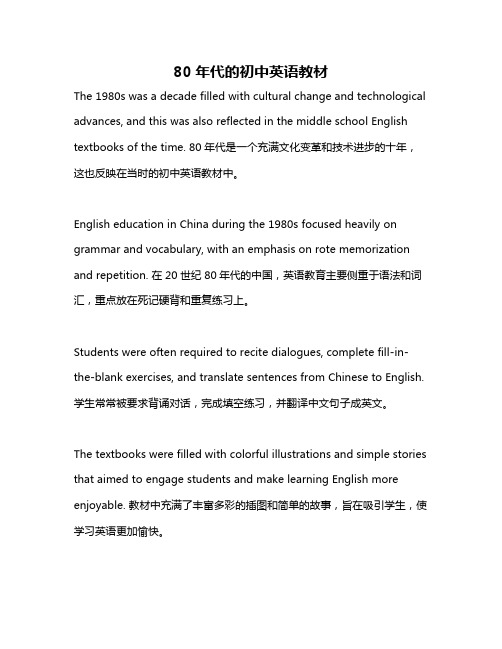
80年代的初中英语教材The 1980s was a decade filled with cultural change and technological advances, and this was also reflected in the middle school English textbooks of the time. 80年代是一个充满文化变革和技术进步的十年,这也反映在当时的初中英语教材中。
English education in China during the 1980s focused heavily on grammar and vocabulary, with an emphasis on rote memorization and repetition. 在20世纪80年代的中国,英语教育主要侧重于语法和词汇,重点放在死记硬背和重复练习上。
Students were often required to recite dialogues, complete fill-in-the-blank exercises, and translate sentences from Chinese to English. 学生常常被要求背诵对话,完成填空练习,并翻译中文句子成英文。
The textbooks were filled with colorful illustrations and simple stories that aimed to engage students and make learning English more enjoyable. 教材中充满了丰富多彩的插图和简单的故事,旨在吸引学生,使学习英语更加愉快。
One of the most memorable aspects of 80s English textbooks was the inclusion of popular songs and rhymes, which helped students learn pronunciation and rhythm. 80年代英语教材最令人难忘的一点是包含了流行歌曲和韵律,这有助于学生学习发音和节奏。
尚博堂初中英语单词 第三册
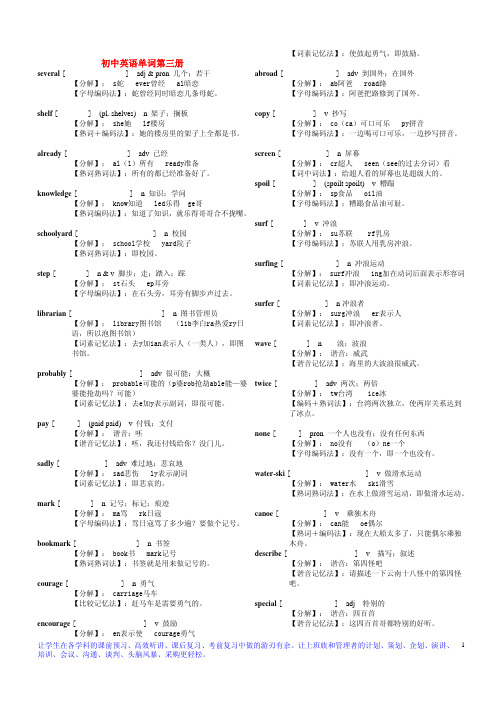
【编码+熟词法】:台湾两次独立,使两岸关系达到
了冰点。
pay [ccc] (paid paid) v 付钱;支付
【分解】: 谐音:呸
none [ccc] pron 一个人也没有;没有任何东西
【谐音记忆法】:呸,我还付钱给你?没门儿。
【分解】: no没有 (o)ne一个
【字母编码法】:没有一个,即一个也没有。
environment [cccccccccccccc] n 环境 【分解】: en摁 viron歪耳龙 ment门徒 【字母编码法】:摁住歪耳龙,不要让它破坏环境, 让门徒看管。
harm [cccc] v 损害;伤害 【分解】: h椅子 arm手臂 【字母熟词法】:烂椅子损伤了手臂。
rubbish [cccccc] n 垃圾;废物 【分解】: rub摩擦 bish匕首 【字母编码法】:摩擦匕首,用来除废物。
litter [ccccc] n & v 垃圾,废物;乱丢杂物 【分解】: little很少 liter公升 【比较记忆法】:很少有垃圾超过一公升那么重。
【字母编码法】:虫子试图贡献布给神。
suppose [ccccccc] v 猜想 【分解】: su速 (p)pose姿势 【字母编码法】:快速猜想一下她的姿势会是什么样 子。
surfer [cccccc] n 冲浪者
librarian [cccccccccccc] n 图书管理员
【分解】: surg冲浪 er表示人
【分解】: library图书馆 (lib李白ra热爱ry日
【词素记忆法】:即冲浪者。
语,所以泡图书馆)
【词素记忆法】:去y加ian表示人(一类人),即图 wave [cccc] n 浪;波浪
colleБайду номын сангаасt [ccccccc] v 收集;搜集 【分解】: colle可乐 ct餐厅 【字母编码法】:到餐厅里去收集可乐瓶。
- 1、下载文档前请自行甄别文档内容的完整性,平台不提供额外的编辑、内容补充、找答案等附加服务。
- 2、"仅部分预览"的文档,不可在线预览部分如存在完整性等问题,可反馈申请退款(可完整预览的文档不适用该条件!)。
- 3、如文档侵犯您的权益,请联系客服反馈,我们会尽快为您处理(人工客服工作时间:9:00-18:30)。
初中英语课本第三册LESSON 1DRILLS (句型练习)Are you going to have a swim? No, I'm not. I'm going to play football.AA: Do youDo they _ often go to the cinema?Does MaryB: No, but r I'm [.they're . going to see a film this afternoon.[she's II m not [They arent . going to have any lessons.She isnt IBA: Are you going to have geography this year?.this term?next year?B: Yes, I am.A: Is Kate -Are they a going to have geography, too?Is your brother /B: Yes, I think so. (No, I don't think so.)CA: What are you going to do - this evening?-this Sunday?tomorrow?B: I 'm going to write some letters.A: What s Jane going to do?B: She's going to do her lessons.- play volleyball.play tennis.TEXT (课文)THE NEW SCHOOL YEARIt's September, and we're back at school. It 's good to see all my teachers and friends again. They all look fine.We're in Grade Two this year. We 're going to have a new subject-physics.I hear physics isn 't easy. I m going to work hard at it. I m not very good at maths, but Wei Fang says she 's going to help me. I think I can do better than last year.I like English very much. I always work hard at it. This year I m going to do more speaking. Zhang Hong likes English too, but he needs help. I m going to help him.This term I m going to work for the wall-newspaper. My classmates say I draw well, and my handwriting is good. It 's interesting work, and I like it.I m going to do my best this year.GRAMMAR (语法)Be going to 结构“Be going to +动词原形”表示就要(即将),打算(做什么)或将要发生的事。
常与tomorrow, tomorrow afternoon, next week, this year等表示将来的时间状语连用。
如:We're going to have a new subject this year.Is Li Ping going to play basket-ball with us?What are you going to do next Sunday?It's going to rain this afternoon.LESSON 2DRILLS (句型练习)What's John going to do? He's going to skate.Where's he going to skate? In the park.AA: What are you doing over there?Are you r drawing a picture?< doing your homework?一writing a letter to Grandpa?B: No. I m reading the newspaper.A: When are you going to r draw the picture [ then?J do your homework a[ write the letter ,B: This evening.What are they going to do C the day after tomorrow? J this Sunday morning?-next Saturday afternoon? They're going to have a volleyball match. Where are they going to have it?They are going to have it 「on the playground. in our school.,at the Children's Palace.CA: Are we going to have r a meeting [ this week?< a talk 卜[an English film 」B: Yes, we are.A: Who s going to r speak at the meeting?J give the talk?-buy the tickets?B: Our teacher [ is, I think.Comrade Wu 卜Li Ping JDIALOGUE (对话)WHAT ARE YOU GOING TO DO TOMORROW?Zhang Hong: It's Sunday tomorrow, you know. What are you going to do? Wang Lin: I m going to watch a volleyball match in the Capital Stadium.It 怎 between a Japanese team and a Chinese team. Zhang Hong: That's great. What time is it going to be?Wang Lin: At four o 'clock in the afternoon. I have two tickets here. I can — let you have one. You want to go, don 't you?Zhang Hong: Of course I do, but I can 't. We 're going to have a table tennis matchtomorrow afternoon.Wang Lin: I see. Who are you going to play?Zhang Hong: A team from the No. 7 Middle School.Wang Lin: Where are you going to have the match? Zhang Hong: At the Children 's Palace. By the way, where's Li Ping, do you know? Wang Lin: He's at home. Why?Zhang Hong: He's got my bat. I must get it back from him.Wang Lin: His home isn't far from here. I think you can find him at home.A: B: A: B:Zhang Hong: Right. I'd better go and look for him now. See you later. Wang Lin: See you later.NOTES:I'd better = I had better, had better 的意思是“最好(做某事)”,后面跟动 词原形。
如:You'd better write him a letter now.GRAMMAR (语法)句子的成分(Members of the sentence (I )组成句子的各个部分叫做句子的成分,即:主语、谓语;表语,宾语,宾 语补足语,定语和状语。
1、主语(The Subject )和谓语(The Predicate句子一般是由主语和谓语两个部分构成的。
主语表明句子里所谈的是“什 谓语说明主语“做什么”,“是什么”或者“怎么样”。
谓语部分 II work hard. II likes her new bike. II are both teachers. 主语(主语部分里主要的词)常用名词、代词或相当丁名词的词或短语等;谓语(谓语部分里主要的词)用动词。
谓语和主语在“人称”和“数”两方面必须一致。
如:LESSON 3DRILLS (句型练习) Can you sing? Yes, I can and I can sing in English, too.AA: Can you skate?-dance?.answer this question?B: No, I can't, but 「John ] can.- they my sister .A: Can you be here at eight tomorrow morning?- ready • back么人”或“什么事物” 如:主语部分WeBettyMy parentsI am reading. You are reading. He (she ) is reading. We are reading.You are reading.They are reading.B: Sorry, I can't be rhere [ so early. y ready \ -back JCA: Excuse me, may I look at that book? have a glass of wateh? use your pen?B: Certainly. Here you are.DA: Must I finish my homework ■ now?-clean the room - stay hereB: Yes, you must.(No, you needn't. You may go home now.)DIALOGUE (对话)AT THE LIBRARYIt's four o clock in the afternoon. Liu Ying is at the library. She 's going to the borrow some books. She's speaking to the assistant.Liu Ying: Good afternoon!Assistant: Good afternoon! Can I help you?Liu Ying: Do you have From Earth to Moon ?Assistant: Let me see ••- Ah, here it is.Liu Ying: Thank you. How long may I keep it?Assistant: Two weeks.Liu Ying: Can I keep it a little longer?Assistant: Yes, you can. But you must come and renew it if you can 't finish it in time.Liu Ying: Must I bring the book back for that?Assistant: Yes, you must. And you mustn 't lend it to others.Liu Ying: All right, I won 't. May I look at some of the new books?Assistant: Certainly. They 're over there.GRAMMAR (语法) 动词的种类(Kind of Verbs)动词是表示动作或状态的词,按其词义和在句子中的作用可分为下列四类:1、行为动词,乂称实义动词(The Notional Verb)表示动作或状态,能独立做谓语。
